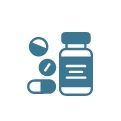General in vivo models encompass a broad spectrum of experimental approaches that involve studying biological processes and disease mechanisms within living organisms. These models are invaluable in biomedical research, providing comprehensive insights into the physiological and pathological states that cannot be replicated in vitro. In vivo models are essential for evaluating pharmacokinetics (PK), pharmacodynamics (PD), and toxicity of new drugs, offering critical data on drug absorption, distribution, metabolism, excretion, and potential adverse effects. At Vivox, we leverage state-of-the-art in vivo models to simulate real-life conditions, ensuring that our findings are highly translatable to human health. This comprehensive approach plays a crucial role in the advancement of medical science and the development of effective treatments.
Our services support a variety of therapeutic areas

Microbiome

Cell & Gene based Therapy

Biological therapy

Cannabis based therapy

Pharmaceuticals

Nutraceuticals

Medical devices
General Models
Pharmacokinetics (PK) and Pharmacodynamics (PD) support
Pharmacokinetics (PK) and pharmacodynamics (PD) encompass the comprehensive evaluation of how drugs are absorbed, distributed, metabolized, and excreted (PK), as well as their effects on the body and the relationship between drug concentration and therapeutic response (PD).
Vivox leverages PK/PD studies in our research to assess drug efficacy, safety, dosage optimization, and therapeutic windows. This integrated approach ensures a thorough understanding of drug behavior and its impact on physiological systems, facilitating the development of effective and safe pharmacological interventions.
Toxicity
Toxicity refers to the harmful effects that substances can have on living organisms, often causing damage to cells, tissues, organs, and/or overall health. Vivox specializes in toxicity studies, utilizing advanced in-vitro and in-vivo models to assess the safety profiles of pharmaceuticals, chemicals, and environmental agents. Our comprehensive approach includes evaluating both acute and chronic toxicity profiles, identifying potential risks, and developing strategies to mitigate adverse effects, to ensure the safety and well-being of both the subjects and the environment.
Maximum Tolerated Dose (MTD)
The Maximum Tolerated Dose (MTD) refers to the highest dose of a drug or treatment that can be administered to subjects without causing unacceptable or severe adverse effects. Determining the MTD of a substance is a critical step in preclinical drug development and is intended to ensure safety while maximizing therapeutic efficacy.
Vivox specializes in MTD studies, employing rigorous dose escalation protocols, toxicity assessments, and monitoring of adverse reactions to determine the optimal dosage range for experimental treatments. Vivox’s expertise in MTD determination ensures the safe and effective use of novel therapeutics in preclinical research and clinical trials, contributing to the development of safe and impactful medical interventions.
Various brain microsurgery techniques
Angiogenesis models
Angiogenesis models are used to study the formation of new blood vessels from pre-existing ones. These models play a crucial role in the understanding of important physiological processes like wound healing, tissue regeneration, and tumor growth. By studying angiogenesis, researchers can investigate factors influencing blood vessel formation, evaluate potential anti-angiogenic therapies, and develop strategies for treating diseases involving abnormal angiogenesis, such as cancer and cardiovascular disorders.
Vivox specializes in angiogenesis models, including in-vitro assays using endothelial cells and in-vivo models utilizing mice or rats. Vivox’s expertise in angiogenesis models contributes to advancing our understanding of vascular biology and developing targeted interventions for angiogenesis-related conditions.
Blood vessels access port implantation for PKPD screening models
Impaired wound healing
Impaired wound healing refers to a delayed and/or inefficient skin healing process, often as a result of chronic diseases or underlying medical conditions.
Vivox specializes in performing impaired wound healing models, using advanced techniques to understand the underlying mechanisms and develop targeted treatments for better healing outcomes. Collaboration with experts aids in advancing research and developing innovative strategies for promoting faster and more effective wound healing.

